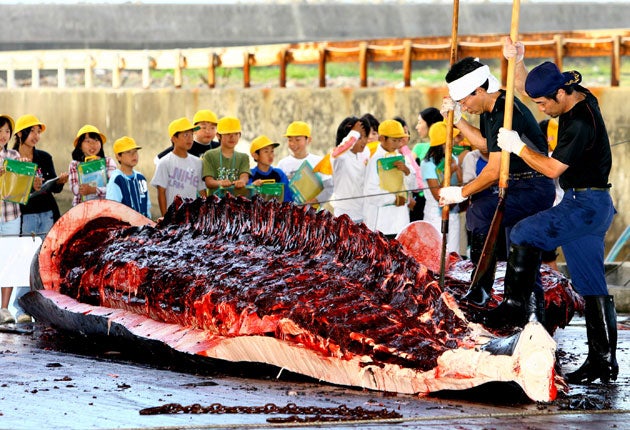UK leads battle to clean up whaling commission
Japan accused of buying the support of members of the IWC with aid and bribery

Your support helps us to tell the story
From reproductive rights to climate change to Big Tech, The Independent is on the ground when the story is developing. Whether it's investigating the financials of Elon Musk's pro-Trump PAC or producing our latest documentary, 'The A Word', which shines a light on the American women fighting for reproductive rights, we know how important it is to parse out the facts from the messaging.
At such a critical moment in US history, we need reporters on the ground. Your donation allows us to keep sending journalists to speak to both sides of the story.
The Independent is trusted by Americans across the entire political spectrum. And unlike many other quality news outlets, we choose not to lock Americans out of our reporting and analysis with paywalls. We believe quality journalism should be available to everyone, paid for by those who can afford it.
Your support makes all the difference.Britain is embarking on a radical attempt to clean up the International Whaling Commission (IWC), which has been increasingly racked by allegations of corruption amongst its member countries.
At the heart of the concerns are repeated accusations that Japan, the leading pro-whaling nation, has been persuading small nations which are members of the IWC to vote in favour of a resumption of commercial whaling, by means of aid packages and the direct bribing of individuals.
There has been an international moratorium on commercial whaling since 1986, but Japan has carried on, describing its activities as "scientific". However, the Japanese are very keen to have the moratorium lifted, and made a determined but vain attempt to do so at last year's IWC meeting in Morocco.
Before the meeting, extensive accusations surfaced about Japanese vote-buying among the smaller IWC members, ranging from Antigua to Ivory Coast, with payments allegedly made to individuals as well as countries. In direct response to these allegations, the British government has now launched an initiative to clamp down on financial and other irregularities within the IWC.
A sweeping resolution put forward for the next IWC meeting, beginning in Jersey a week on Monday, would radically revise the commission's procedures, some of which date from its founding in 1946, are regarded as lax and inadequate and "leave it open to accusations of malpractice," in the words of Britain's Fisheries minister, Richard Benyon.
In particular, the UK resolution would end the astonishing situation where the 89 IWC member states are allowed to pay their annual subscriptions by cheque or in cash, instead of by bank transfer, as is the normal case with international organisations. It is thought that some of these subscriptions, which range from £100,000 in the case of Japan to about £4,000 for small states, have been paid in the past with Japanese-provided funds.
The British resolution also seeks to make the IWC's own scientific reports more rigorous, make its record-keeping more timely and accurate, and make its meetings more open to representatives from environmental pressure groups and other non-governmental organisations.
It was originally intended to be a resolution from the European Union, but although 26 of the 27 EU member states supported it, Denmark did not. The Danes tend to side with the pro-whaling countries because their associated territories, Greenland and the Faroes, have whaling traditions. Britain is therefore putting the resolution forward alone, although with EU support.
"This is about cleaning up the IWC," said Mr Benyon, who will be leading the British delegation to the Jersey meeting. "At the moment, it doesn't have what one would rate as the basic minimum of governance standards.
"I thought the allegations made last year were very, very serious. These were accusation of people taking bribes, and as far as I'm aware no court cases have resulted from this. So one has to face the reality that the whole organisation is damaged when such allegations are made, and we need to have an organisation that cannot leave itself open to such accusations."
Britain's position remained that "we are resolutely opposed to a resumption of commercial whaling," Mr Benyon said.
"If people thought Fifa [football's governing body] was bad, the IWC is something else," said Chris Butler-Stroud, chief executive of the Whale and Dolphin Conservation Society. "We warmly welcome the Government's move."
There has never been any suggestion of malpractice within the secretariat of the IWC, which is based in Cambridge.
Join our commenting forum
Join thought-provoking conversations, follow other Independent readers and see their replies
Comments